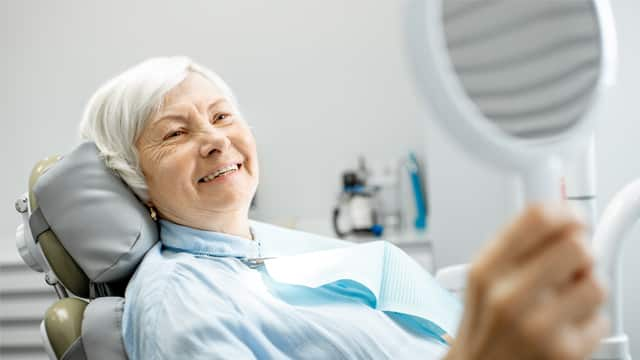What are Dentures?
Dentures are removable restorative appliances that replace missing or lost teeth. Depending on the condition your teeth are in, you may be fitted with a full or partial set. Full or complete dentures replace all of the upper/lower teeth. But if you have gaps between your smile, a set of partial dentures will work best. Partial dentures can be attached to your natural teeth with metal clasps or precision attachments. These replacement teeth have a natural look that can improve your smile and make eating and speaking easier.
Adjusting to New Dentures
Once you've been fitted with your new set of dentures, it may feel strange as your mouth, jaw, and gums adjust to the dental appliance. You may be wondering how long it takes to get used to dentures? It may take a few weeks before your mouth gets used to your replacement teeth. But by practicing some patience and following aftercare instructions from your dentist, you should be well on your way. Minor irritation and soreness are common during the first few days, as is excessive saliva flow, a normal reaction to having a "foreign object" in your mouth. The good news is all of these issues should diminish as your mouth gets accustomed to the new teeth. Remember to consult with your dentist if discomfort or hypersalivation persists.
Eating with Dentures
Simple tasks like eating and speaking may be challenging after getting dentures. Eating the right types of foods during the adjustment period will reduce tension and stress in your jaw muscles. Here are some helpful tips on how to eat with dentures:
- Eat soft foods: Mash or puree some of your favorite fruit and vegetables like potatoes, carrots, avocado, or apples. Easy to chew foods like bananas, pudding, and yogurt are great too.
- Small pieces of food: Cut food into small pieces and chew gently using both the right and left sides of the mouth.
- Check the temperature: You may not be able to sense temperature as easily after getting new dentures. Test if food has cooled down enough by placing it on the lips first.
- Avoid hard to chew foods: Excessive chewing or biting into hard and crunchy foods can cause discomfort.
Speaking with Dentures
It may be harder to speak with a new set of dentures, and you may even struggle to enunciate "s" and "f" sounds. Luckily, there a few things you can start doing to learn how to improve your speech.
- Practice speaking and reading aloud.
- Speak slowly if you notice a clicking sound when you speak.
- Bite and swallow before speaking, especially if you feel that your dentures are incorrectly positioned.
- Talk to a friend; this can help you feel less self-conscious about how you sound.
Remember that it is normal for your replacement teeth to feel awkward at first. Ease into them by speaking out loud when your alone or with a close friend. Incorporate soft foods into your diet and be mindful of how you chew your food. With practice, you'll be able to eat, talk, laugh, and smile confidently.
This article is intended to promote understanding of and knowledge about general oral health topics. It is not intended to be a substitute for professional advice, diagnosis or treatment. Always seek the advice of your dentist or other qualified healthcare provider with any questions you may have regarding a medical condition or treatment.
ORAL HEALTH QUIZ
What's behind your smile?
Take our Oral Health assessment to get the most from your oral care routine
ORAL HEALTH QUIZ
What's behind your smile?
Take our Oral Health assessment to get the most from your oral care routine














